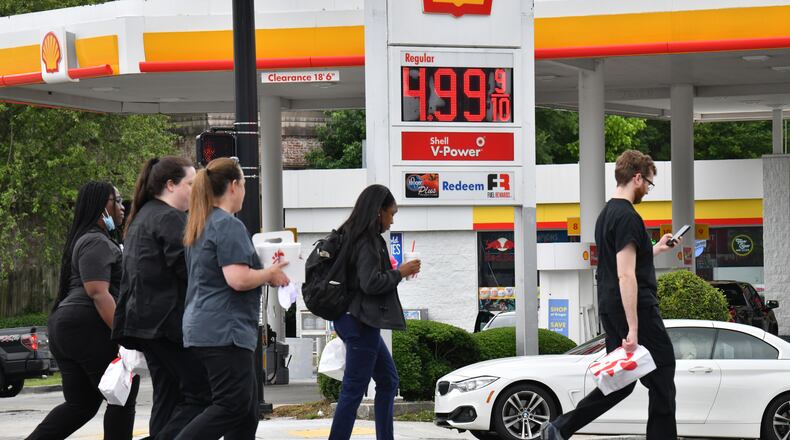Like a vacuum cleaner hose deep into our wallets, the pump prices are cleaning us out.
Thanks to a poisonous mix of global oil prices, refinery repairs and the continuing Russian war with Ukraine, the average price of gasoline in metro Atlanta hit an all-time high of $4.31 a gallon by mid-day Tuesday, according to Gas Buddy, which tracks prices nationwide.
It is pretty limited comfort to know that in terms of consumer buying power, the prices at points in 2005 and 2008 were worse. The post-hurricane highs in 2005 were the equivalent of nearly $6 a gallon now.
Prices, which rose last year as consumers came back to the roads from pandemic shutdowns, had leveled off in the fall with the spread of the Omicron variant. When infections waned, driving accelerated and prices took off.
But the price hikes got turbo-charged this spring with the Russian war. Now, global traders have bid the prices up even farther.
A week ago, gas was $4.16 a gallon in metro Atlanta. A month ago, it was less than $4. And a year ago, it was under $3.
For an average driver, using about 34.5 gallons of gas each month, the difference between the price in mid-May and a month at the current level would be an extra $16.90.
Politically, of course, higher prices are a nightmare, especially because a president’s power to affect them is modest at best.
Nevertheless, critics of a president often tag the White House with responsibility for high gas prices, while arguing that low prices are caused by something else. But George W. Bush wasn’t to blame for the hurricanes and pipeline disruptions of 2005 that sent prices skyward. And Bill Clinton wasn’t responsible for the surge in Saudi production that drove prices down and helped juice the 1990s economy.
Critics of the Biden administration have placed blame on policies aimed against fossil fuels, which are seen as a major factor in climate change. But experts say virtually all those actions — like spiking part of the Keystone pipeline — had no effect on current production. And when Biden tried to lower prices by releasing oil from the nation’s strategic reserve, it didn’t have much effect.
Even efforts by states, including Georgia, to tame prices by curtailing gas taxes hasn’t worked.
Moreover, the price of gasoline has soared around the world, not just in the United States. As often, the experts say it’s about supply and demand.
In the early months of the pandemic, millions of drivers stayed off the roads and away from airports. The price — and production — of oil in the United States and globally plummeted. But as U.S. drivers went back to their vehicles, the ramp-up of oil production has been slower.
It is easy to grab your keys.
And while it’s easy to turn off the machinery, it is slow and expensive to again start drilling and fracking.
The global price of oil historically has accounted for the lion’s share of pump prices and oil prices have rocketed from less than $75 a barrel last fall to nearly $120 a barrel now, according to Oil Price.com.
Yet, there is another step on the way to the gas station and that has been a problem in the United States.
Oil has to be refined into gasoline, diesel or jet fuel before being used as fuel. And a new refinery hasn’t been built in this country for more than 40 years. While many refineries have been expanded, the production of fuel is often just ahead of demand.
And when one of the old refineries does go down for repairs or because of hurricane damage, it can leave the U.S. with a supply crunch, which in turn sends prices soaring. Existing refineries are not keeping up with demand, an executive at energy consulting firm Turner, Mason & Co. recently told USA Today.
Metro Atlanta, average gas price for regular
Tuesday, mid-day: $4.31
Monday: $4.30
One Week Ago: $4.16
One Month Ago: $3.82
One Year Ago: $2.91
Previous highs:
$4.11 (July 2008, Sept. 2005)
Previous, highs in current dollars
2005: $5.98
2008: $5.40
Gas used by the average driver each month
34.5 gallons
Sources: Energy Information Administration, Bureau of Labor Statistics, Gas Buddy
About the Author
Keep Reading
The Latest
Featured


